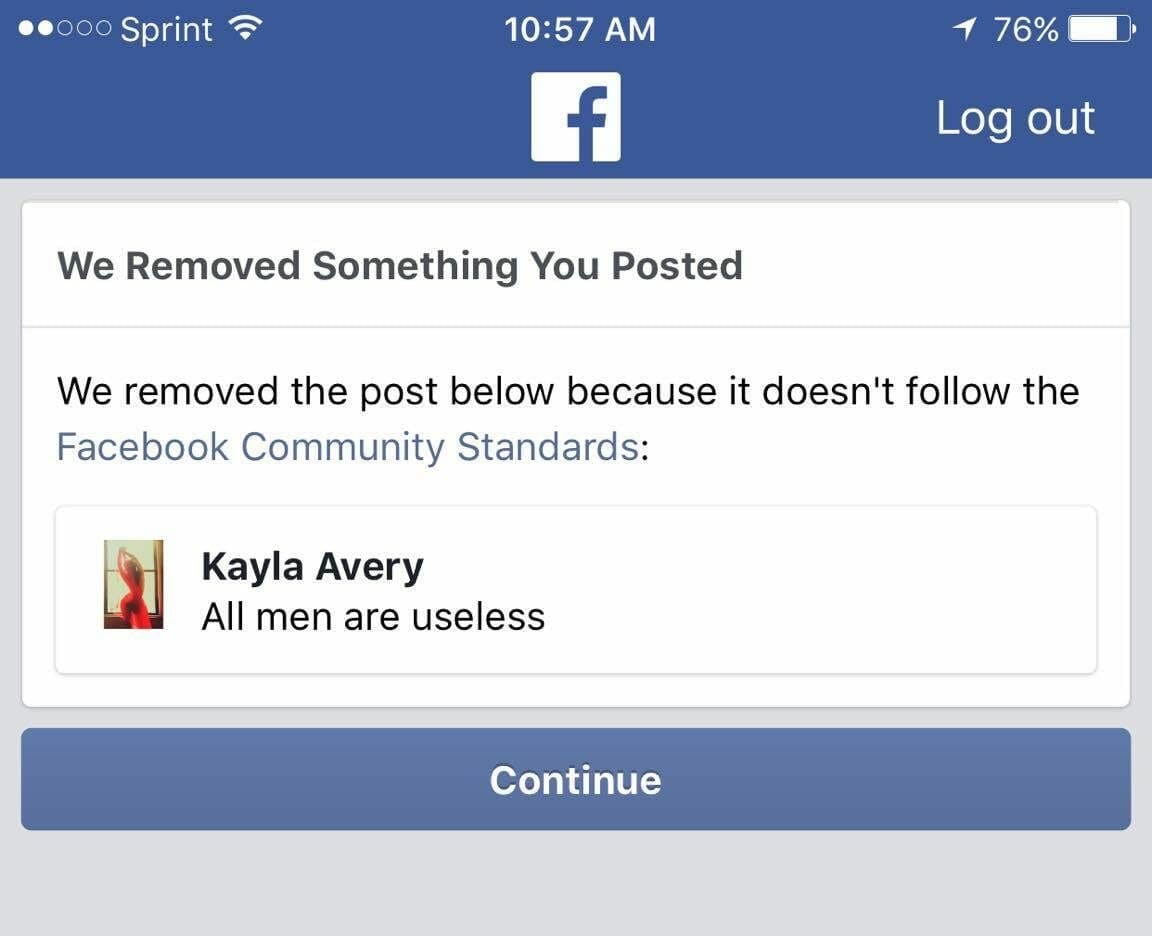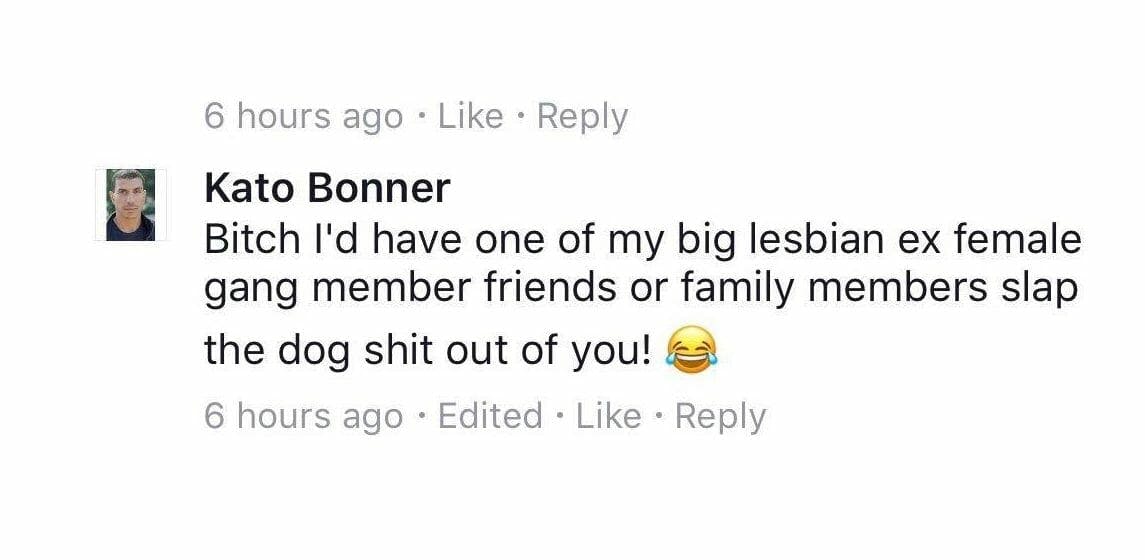In October, Marcia Belsky received a 30-day Facebook ban for three words: “Men are scum.”
She had posted the sentence without a second thought. It was buried in the comment section of a friend’s photo album showing all the messages she’d received from men in the wake of #MeToo. Belsky’s friend, writer Nicole Silverberg, had written a list of things men can do better and, unsurprisingly, many men did not like that. Their comments were angry, chastising, and some were even anti-Semitic and violent.
Belsky was baffled. Could language as tame as “men are scum” really be construed as hate speech when so much of what she saw on Facebook—threats of rape and violence, profanity, and harassment—seemed so much worse?
According to Facebook’s community guidelines, yes. The guidelines protect groups based on gender, ethnicity, and religion. And those benefits extend to the group “men.” So, unfair as it may seem, any blanket statement about men could potentially qualify as hate speech.
This wasn’t Belsky’s first ban from Facebook, either. The New York-based comedian had previously posted what she thought was a humorous photo. It featured her younger self smiling innocently, with the words “Kill All Men” photoshopped into a cartoon speech bubble beside her cherubic face.

When the photo was removed, she says she took the punishment with begrudging acceptance.
Belsky told the Daily Dot, “I was like… fine. I get that. If they punish the serious ‘Kill all Muslims’ people, then I’m fine with them getting that photo too. Only they don’t punish the ‘Kill all Muslims’ people.”
But the subsequent bans Belsky has received were for less-obvious reasons. Belsky got slapped with a one-week ban when she warned women in her community not to respond to a specific man’s roommate wanted ads. “[He was] a predator…who was trying to convince women to live with him before they learned of his reputation,” she said. “I didn’t tag him, but I named him by name because he was posting ads like ‘seeking roommate: females only.’”
Although the post was made in an effort to protect people, Facebook deemed it harassment. Belsky was frustrated.
But the “men are scum” ban floored her. As a comedian, she often uses Facebook to promote her performances by showing her irreverent, misandrist brand of wit. Would this mean she could no longer make jokes?
Belsky’s experience led her to look at a larger pattern in her community. Other women were being banned for similarly innocuous comments, while threatening comments and harassing language went largely ignored. Said Belsky, “At first I [was] like, ‘Am I paranoid?’ But then you see this pattern behavior of misogyny being protected while misandry is being very well-handled.”
Fellow comedian Kayla Avery has been banned from Facebook five times. The offenses that got her banned and censored vary from calling men “trash” to “useless” to “the worst.” Avery is so accustomed to being censored and banned that she has a name for it: Facebook Jail. She is currently working on a project documenting the stories of those who’ve been Facebook Jailed.

Part of the reason Avery and Belsky have been banned so many times is once you’ve committed a violation of the community guidelines, the offense stays with you. Each subsequent infraction leads to a greater punishment than the last, and Facebook currently has no method of offering users a clean slate.
While Avery understands the Facebook policy of escalating punishments for repeat offenders that led to her bans, she finds it frustrating that once you are banned, there is no system of appeal. “There’s no way to contest a ban after you get notice that your post was violating community standards and you’re banned for X amount of days,” said Avery.
Avery has also reported disturbing, harassing comments to no avail.
While Facebook’s community guidelines are written to protect against “hate speech,” more specific attacks are reviewed as harassment. A Facebook representative who spoke to the Daily Dot offered this example: “If I attack you for being a female that would amount to hate speech. But if I attack you because I have something against journalists that would qualify as harassment.”

As a victim of targeted harassment, Avery finds Facebook’s execution of its policies particularly unnerving. “It’s just maddening that like something so harmless is getting categorized as ‘hate speech,’ but yet when I report a video of a man calling me by my first and last name ‘a whore heroin addict who prostitutes herself to pay for drugs,’ I’m told that it doesn’t go against Facebook’s policy.”
Comedian Elsa Waithe has been banned from Facebook three times, but she says she doesn’t feel the bans have inhibited her preference for irreverent humor. If anything, Facebook’s punitive measures have emboldened her to keep speaking up. “For me, it means I’m possibly saying something right even…I’m obviously pressing some type of button.”
Waithe’s first offending post included a joke about deporting “all white people.” She made the post in 2016, in reference to Donald Trump’s proposed Muslim ban. It wasn’t until January of 2017, though, that Waithe received notification of her first 30-day ban.
Then in April, Waithe posted an image that had been going around of men holding shotguns next to their daughters and their prom dates. She shared it with the caption, “Men know that other men are trash which is why these types of photos are popular.” She received another 30-day ban. Initially, she thought it was because of the guns in the image. She says it was only later when she heard about Belsky’s “men are scum” ban that she made the connection.
Belsky says that it’s hard to look at all these incidents and not wonder what is going on behind the scenes at Facebook. “You start to think the people making these rules are trolls themselves.”
She also feels that creating blanket rules to protect groups without accounting for power dynamics and privilege is unfair to the oppressed. “That is Facebook making a decision that misogyny and racism are equal to misandry and ‘reverse-racism’ and they’re ignoring the power structure,” said Belsky.
In a time where social media is used so heavily to share information and spread ideas, the pattern points to pressing questions: Whose voices are amplified and whose are silenced? Who gets to lead conversations about race and gender on the internet? Who is asked to take a seat?
According to Facebook, the company’s aim isn’t to silence anyone. A representative told the Daily Dot, “We want people to use the platform to express themselves and I think sometimes when people express themselves not everyone is going to agree with those opinions, so there’s room for that. But we want Facebook to be a safe space, a respectful space for everyone who is using it…that’s the goal of our team.”
She also conceded that the company is aware of the flaws in its system. “We’re not perfect by any means. We make mistakes… We know there’s a lot more we can and should be doing here. That’s why the team [that develops content policies] sits down every week and asks, ‘Are there gaps that we need to be addressing here?’”
According to the Facebook representative, that team is made up of diverse members from former teachers to prosecutors to a woman who worked at a rape crisis center. She added, “The policies aren’t developed in a vacuum. We consult with researchers and academics. We work with outside groups to get their feedback and expertise.”
There’s also a community global team. Since Facebook serves a global community, complications can arise in terms of processing a complaint in the correct context. The community team is responsible for routing reports of community guideline violations to the “right people.”
“We’ve made a concerted effort to hire more people who have expertise in different areas,” the representative said. “Your policy and your enforcement is only as good as the people that are working to develop and enforce that policy.”
However, she also said, “It sounds like we did make mistakes in some of these cases, and so I do want to look into those and correct those mistakes.”
Shortly after the Daily Dot spoke to the Facebook rep, Belsky said that her 30-day ban was lifted. The company gave no explanation.


